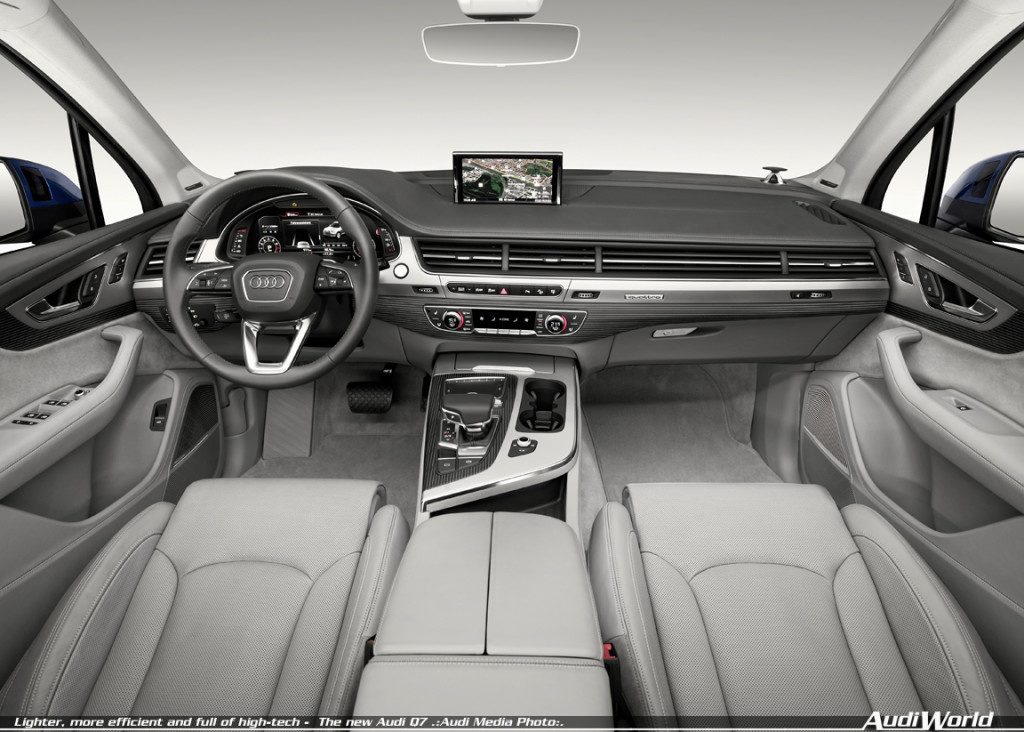Lighter, more efficient and full of high-tech – The new Audi Q7
The new Q7: a statement of the high-tech competence of Audi
Luxurious comfort, the largest interior in the segment and a weight saving of up to 325 kilograms (716.5 lb) – the new edition of the Q7 from Audi sets new standards. Its innovative assistance and infotainment systems take the large SUV to the front of the pack. Its new engines consume significantly less fuel than the previous model. In the Audi Q7 3.0 TDI e-tron quattro the brand with the four rings for the first time combines an efficient plug-in hybrid drive with quattro permanent all-wheel drive.
Prof. Dr. Ulrich Hackenberg, Member of the Board of Management for Technical Development at Audi, summarizes the major strengths thus: “The new Audi Q7 is the embodiment of Vorsprung durch Technik: With up to 28 percent less fuel consumption than its predecessor, it achieves the best score in efficiency in the competition. Its low weight is also a benchmark in its class. It has the latest assistance systems, infotainment modules and connect features on board.”
The new Q7 is the lightest car in its class
The 3.0 TDI version of the Audi Q7 with five seats has an unladen weight (without the driver) of merely 1,995 kilograms (4,398.2 lb) – up to 325 kilograms (716.5 lb) less than the predecessor model, depending on the equipment. With its lightweight, multi-material body and all-new chassis, it provides excellent comfort while at the same time offering the performance of a sporty Audi – and that with top-notch CO2 values.
Dynamics as standard
Powerful engines combined with an adaptive suspension and the lightweight body make the Q7 the dynamic car among large SUVs. Just a few years ago these performance data were still the prerogative of sports cars. The 3.0 TFSI with 245 kW (333 hp) and the 3.0 TDI with 200 kW (272 hp) bring the new Audi Q7 from 0 to 100 km/h (62.1 mph) in 6.1 seconds and 6.3 seconds, respectively. The top speed of 250 km/h (155.3 mph) is a mere formality for the TFSI, while the TDI effortlessly sprints to 234 km/h (145.4 mph), all the while with unusually low fuel consumption. The diesel V6 consumes on average just 5.7 liters of fuel per 100 km (41.3 US mpg), corresponding to 149 grams of CO2 per km (239.8 g/mile). The TFSI needs only 7.7 liters per 100 kilometers (30.5 US mpg) and emits only 179 grams of CO2 per kilometer (288.1 g/mi).
Innovative operation and display.
The new Audi Q7 also sets standards when it comes to operating concept, infotainment and connectivity. The second-generation modular infotainment platform is optionally on board, as is the Audi virtual cockpit. The new MMI all-in-touch control unit with large touchpad makes operation intuitive and simple. The Audi tablet for rear passengers and the two sound systems with 3D sound are further innovations. Also new is the smartphone integration of Google Android Auto and Apple CarPlay through the new Audi smartphone interface.
No other production car in the segment has more assistance systems
Another highlight is the extremely broad and graduated range of new driver assistance systems – including adaptive cruise control with traffic jam assist, the predictive efficiency assistant, the trailer assist and the cross-traffic assist in the rear. No other production car currently offers more in this area of technology.
The Audi Q7 also as a plug-in hybrid with quattro drive
The Audi Q7 e-tron quattro, to arrive at German retailers in early 2016, is the first diesel-powered plug-in hybrid from Audi and also the first diesel plug-in hybrid with quattro drive in the premium SUV segment. It has a system output of 275 kW (373 hp) and a system torque of 700 Nm (516.3 lb-ft). In the New European Driving Cycle (NEDC), it consumes only 1.7 liters of fuel per 100 kilometers with 46 g CO2 per km (138.4 US mpg / 74.0 g/mi). A full charge of its lithium-ion battery suffices for a distance of up to 56 kilometers (34.8 mi) in the NEDC.

